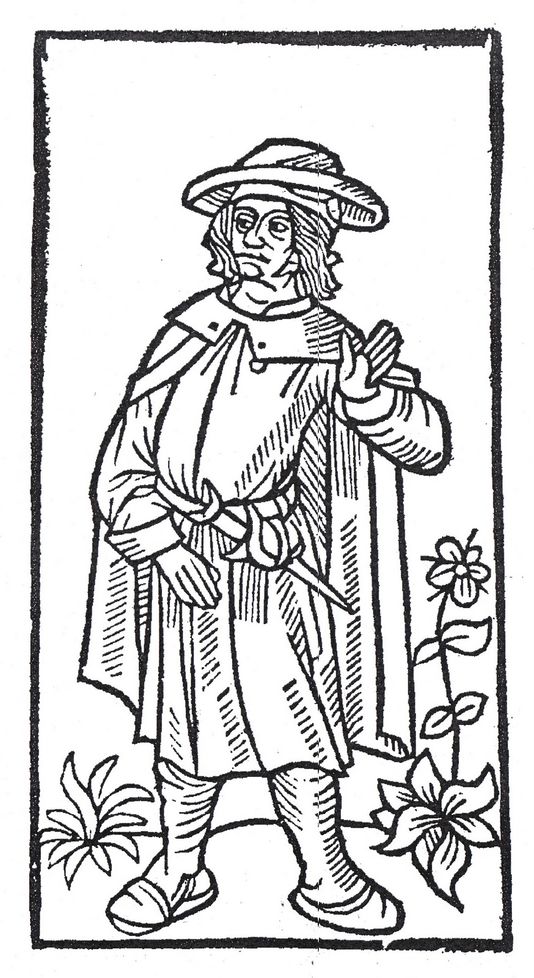François Villon: Frases en inglés
Bien est verté que j'ay amé
Et ameroie voulentiers;
Mais triste cuer, ventre affamé
Qui n'est rassasié au tiers
M'oste des amoureux sentiers.
Au fort, quelqu'ung s'en recompence,
Qui est ramply sur les chantiers!
Car la dance vient de la pance.
Fuente: Le Grand Testament (The Great Testament) (1461), Line 193.
"De chiens, d'oyseaulx, d'armes, d'amous,"
Chascun le dit a la vollee,
"Pour une joye cent doulours."
Fuente: Le Grand Testament (The Great Testament) (1461), Line 622.
Folles amours font le gens bestes:
Salmon en ydolatria,
Samson en perdit ses lunettes.
Bien est eureux qui riens n'y a!
Fuente: Le Grand Testament (The Great Testament) (1461), Line 629; "Double Ballade".
“Villon, our sad bad glad mad brother's name.”
Algernon Charles Swinburne "A Ballad of Francois Villon, Prince of all Ballad-Makers" (1878), line 10.
Criticism
Mes jours s'en sont allez errant.
Alternative translation: My days are gone a-wandering.
Fuente: Le Grand Testament (The Great Testament) (1461), Line 217.
Robert Louis Stevenson Familiar Studies of Men and Books (London: Chatto & Windus, 1882), ch. 6.
Criticism
“We were two, but only had one heart.”
Deux estions et n’avions qu'ung cuer.
Alternative translation: We were two and had but one heart between us.
Fuente: Le Grand Testament (The Great Testament) (1461), Line 986; "Lay".
Vente, gresle, gelle, j'ay mon pain cuit.
Ie suis paillart, la paillarde me suit.
Lequel vault mieulx? Chascun bien s'entresuit.
L'ung vault l'autre; c'est a mau rat mau chat.
Ordure amons, ordure nous assuit;
Nous deffuyons onneur, il nous deffuit,
En ce bordeau ou tenons nostre estat.
Fuente: Le Grand Testament (The Great Testament) (1461), Line 1621; "Ballade de la Grosse Margot (Ballade for Fat Margot)".
“But where are the snows of bygone years?”
Mais ou sont les neiges d'antan?
Alternative translation: But where are the snows of yesteryear?
Fuente: Le Grand Testament (The Great Testament) (1461), Line 336; "Ballade des Dames du Temps Jadis (Ballade of the Ladies of Bygone Times)".
“But where is last year's snow? This was the greatest care that Villon, the Parisian poet, took.”
François Rabelais, Gargantua and Pantagruel, Chapter xiv.
Criticism
“Brother men who after us live on,
Harden not your hearts against us.”
Freres humains qui après nous vivez,
N'avez les cuers contre nous endurcis.
"L'Epitaphe Villon (Villon's Epitaph)", or "Ballade des Pendus (Ballade of the Hanged)", line 1. (1463).
Prince, je congnois tout en somme,
Je congnois coulourez et blesmes,
Je congnois Mort qui tout consomme,
Je congnois tout, fors que moy mesmes.
"Ballade des Menus Propos (Ballade of Small Talk)", line 25. (1458).
Mais, quoy que soit du laboureux mestier,
Il n'est tresor que de vivre a son aise.
Fuente: Le Grand Testament (The Great Testament) (1461), Line 1501; "Ballade: Les Contrediz de Franc Gontier (Ballade: Franc Gontier Refuted)".
Prince, aux dames Parisiennes
De beau parler donnez le pris;
Quoy qu'on die d'Italiennes,
Il n'est bon bec que de Paris.
Fuente: Le Grand Testament (The Great Testament) (1461), Line 1539; "Ballade des Femmes de Paris (Ballade of the Women of Paris)".
Arthur Symons Figures of Several Centuries (London: Constable, 1916) p. 40.
Criticism
“In this faith I wish to live and die.”
En ceste foy je vueil vivre et mourir.
Fuente: Le Grand Testament (The Great Testament) (1461), Line 882; "Ballade pour Prier Nostre Dame (Ballade as a Prayer to Our Lady)".
